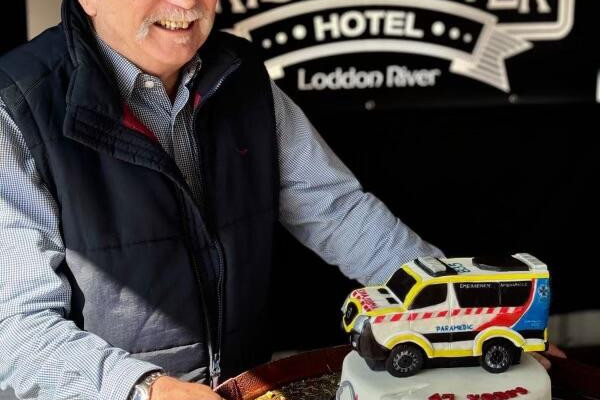General News
4 November, 2024
Training, care top David's career
By RUBY HYLAND ONE of the Loddon’s most recognisable ambulance officers is preparing to take a back seat after almost half a century on the frontline. David Booth was in Inglewood when the shire’s first ambulance station opened in 1982. After...

By RUBY HYLAND
ONE of the Loddon’s most recognisable ambulance officers is preparing to take a back seat after almost half a century on the frontline.
David Booth was in Inglewood when the shire’s first ambulance station opened in 1982.
After a stint in Gippsland, he returned to live in Bridgewater while co-ordinating driver training for Ambulance Victoria.
That stellar 47-year career has now been celebrated with a function attended by colleagues and family.
David started as an ambulance officer in Sale and has since seen him all over Victoria as he filled a myriad of roles before his current role in driving standards and training.
In 1982, he had moved to Inglewood to assist in establishing the first ambulance station in the Loddon Shire.
“It was a great opportunity to be involved with the community while building and establishing the station” David said of the experience.
The new station filled gaps between Bendigo and Charlton and Maryborough and Kerang.
After working in Inglewood, David moved to Lakes Entrance where his family lived for 15 years, before returning to Bridgewater in 2010.
David said he had seen a plethora of changes within Ambulance Victoria and among the public over the decades.
The change in the equipment stored in an ambulance between then and now dramatically different, especially with technological advancements over the past few decades.
“I can’t compare them because what we had back then was state of the art at the time and what we have now is still state of the art but is totally different.” David said.
The technological advancements to assist with manual handling of patients are something that David is glad to see.
Decades of rigorous physical work as a paramedic without the assistance of today’s manual handling support tools, have taken a toll on David’s body. Which is something that he hopes the new graduates will be able to avoid now as having to physically lift a patient or a stretcher without aid is an uncommon occurrence.
Another area that has improved throughout David’s career is the support provided by Ambulance Victoria for their employees.
“Unfortunately, with this kind of job you see things you will never unsee but there’s plenty of support available to help provided by Ambulance Victoria”, he said.
While he has seen the good, the bad and the ugly in his career, David chooses to focus on the good, such as the 28 babies he delivered while on the job, some of which he was able to see grow up while living in Lakes Entrance, an opportunity that isn’t as common generally.
In recent years David noted that he has been called to far less fatalities on the road compared with when he first started, something that he attributes to changes in laws, such as drink driving as well car safety features.
David said he was glad that now many people were able to walk away from car accidents compared with the past.
Throughout his career David has worked in several specialised roles such as an emergency operator in Wangaratta, at head office in Ballarat and as a clinical educator.
Although he has extensive experience in a multitude of ambulance Victoria roles, education has been his passion.
The adjustment from shift work to his current driving training role was a welcome change after many years of on-call work.
His work now revolves around reducing risk to ambulance drivers and a focus on safety. The low-risk driving program is mandatory for all graduate paramedics to maintain standards across the state as well as ensuring everyone has the same knowledge and skills to operate an ambulance safely.
In addition to keeping the program up to date, David is responsible for training other educators to deliver the courses. Currently he manages a team of 115 people across Victoria, a job he is able to do with the external qualifications he has completed in training and assessment.
All members of the team must have five years of experience as a paramedic before joining.
In 2003 David created the 4WD program to stay ahead of the game, a program still in use and as new challenges arise the programs will continue to be adapted to resolve them.
Five years ago, David was awarded an Ambulance Service Award, to recognise distinguished service with Ambulance Victoria.
David’s work with Ambulance Victoria continues to keep both paramedics and motorists safe during times of emergency with ambulance drivers using their knowledge of low risk driving to travel safely and minimise delays on their journeys.
“Working with Ambulance Victoria for so long, I’ve learnt so much from so many - experienced senior staff and new graduates. We always keep learning.”